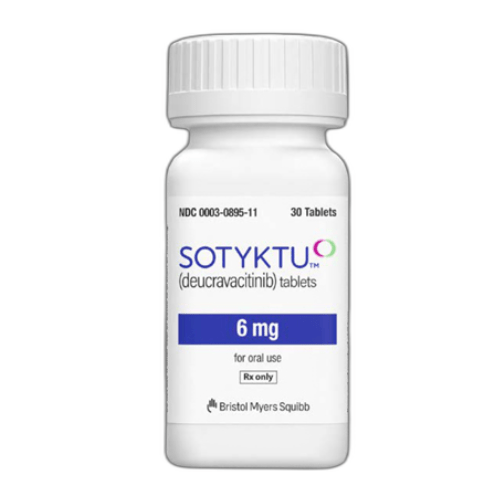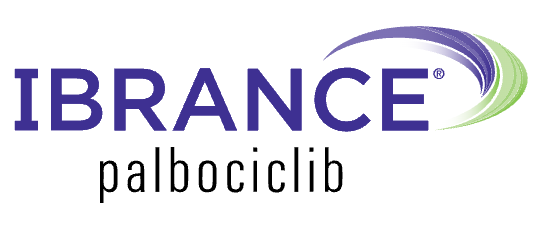Introduction

Sotyktu (deucravacitinib) is a groundbreaking oral medication for the treatment of adults with moderate-to-severe plaque psoriasis. Developed by Bristol Myers Squibb, it selectively inhibits allosteric tyrosine kinase 2 (TYK2) and is taken daily. The FDA approved Sotyktu on 9th September 2022.
What is Sotyktu?
- Deucravacitinib, a TYK2 inhibitor, is chemically described as 6-(cyclopropanecarbonylamido)-4-[2-methoxy-3-(1-methyl-1,2,4-triazol-3-yl)anilino]-N-(trideuteriomethyl) pyridazine-3-carboxamide, appearing as a white to yellow powder with pH-dependent solubility.
- Inactive components include anhydrous lactose, croscarmellose sodium, hypromellose acetate succinate, magnesium stearate, microcrystalline cellulose, and silicon dioxide.
Indication Of Sotyktu
SOTYKTU, a TYK2 inhibitor, is approved for treating moderate-to-severe plaque psoriasis in adults eligible for systemic therapy or phototherapy. It is not recommended in combination with other potent immunosuppressants.
What Is Plaque Psoriasis?
Plaque psoriasis is the most common form of psoriasis, a chronic autoimmune condition that affects the skin. It is characterized by the development of raised, inflamed, and scaly patches of skin, known as plaques, which can be itchy and painful.
These plaques typically appear as raised, red patches covered with a silvery white buildup of dead skin cells or scale, and they can occur anywhere on the body, with the most common areas being the scalp, knees, elbows, and torso. Plaques often appear symmetrically on the body, affecting the same areas on the right and left sides.
Additionally, plaque psoriasis can accompany nail psoriasis, which may cause discoloration, pitting, or separation of the nail from the nail bed
Symptoms and Diagnosis
The symptoms of plaque psoriasis include:
- Raised, inflamed, and scaly skin patches that may be itchy and painful.
- Plaques appearing as raised, red patches covered with a silvery white buildup of dead skin cells or scale.
- Plaques can appear anywhere on the body, with common areas being the scalp, knees, elbows, and torso.
- Symmetrical appearance of plaques on the body, affecting the same areas on the right and left sides.
- Accompanying nail psoriasis, which may cause discoloration, pitting, or separation of the nail from the nail bed
To diagnose psoriasis, a doctor usually examines the skin, scalp, and nails for signs of the condition and may also ask about the patient’s health, medical history, and family history. In some cases, a small skin sample may be taken to rule out other skin conditions that resemble psoriasis
Existing treatment options, such as topical medications, phototherapy, and biologic injections, have limitations and may not be suitable for all patients. The choice of treatment depends on the type and severity of psoriasis, its location on the body, and the possible side effects of the medications. It is essential for individuals with psoriasis to work closely with their healthcare provider to determine the most suitable treatment plan for their specific condition.
Mechanism of Action of Sotyktu
Sotyktu’s mechanism of action involves selectively inhibiting TYK2, a protein that plays a role in immune cell activation and inflammation. By blocking TYK2, Sotyktu reduces the inflammation and cellular processes that contribute to the development and persistence of plaque psoriasis.
Potential Benefits for Treating Plaque Psoriasis
Clinical trials have shown that Sotyktu is effective in treating moderate-to-severe plaque psoriasis, with 58% of patients experiencing a 75% improvement in psoriasis area and severity after 16 weeks of treatment, compared to 13% reported in those taking a placebo. The medication demonstrates a consistent safety profile, with no increases in adverse events.
Clinical Data and Evidence
Key findings from clinical trials on Sotyktu’s efficacy and safety include:
- 73.2% of patients with plaque psoriasis on continuous Sotyktu treatment maintained PASI 75 up to 3 years.
- Sotyktu demonstrated superior efficacy compared to placebo and showed persistent responses through 52 weeks.
Dosage and Administration
To take Sotyktu, patients should follow these guidelines:
- Take the medication once daily.
- Take Sotyktu with or without food.
- If a patient cannot swallow whole tablets, they may take the tablet with water or swallow the tablet whole.
Patient Experience
Real-life stories from patients who have found success with Sotyktu are not available in the provided search results. However, the medication has shown promising results in clinical trials, leading to its FDA approval.
Comparison with Existing Treatments
While existing treatments for plaque psoriasis include topical medications, phototherapy, and biologic injections, Sotyktu offers a new option for patients who may not respond well to or cannot tolerate these therapies. It is essential to consult with a healthcare professional to determine if Sotyktu is the right treatment for you and to monitor for potential side effects.
Warning And Contraindication
- Sotyktu is not recommended for use in combination with other potent immunosuppressants.
- Sotyktu is not known to be safe and effective in children under 18 years of age.
- SOTYKTU is contraindicated in individuals with an active and serious infection, including localized infections.
- Commencement of SOTYKTU should be avoided in the presence of any infection unless approved by the healthcare provider. There’s an increased risk of developing shingles (herpes zoster).
- Before initiating SOTYKTU, inform your healthcare provider if you are undergoing treatment for an infection, have a persistent or recurrent infection, tuberculosis (TB), or a history of hepatitis B or C.
- Disclose all medical conditions, including liver or kidney problems, high triglyceride levels, recent or scheduled immunizations (live vaccines should be avoided during SOTYKTU treatment), pregnancy, and breastfeeding.
Precautions
Regular screening for tuberculosis exposure is required before starting treatment.
Sotyktu may lower the ability of the immune system to fight infections and increase the risk of infections.
Drug Interactions
Sotyktu may interact with other medications, so it is essential to inform your healthcare provider of all the medications you are taking. Provide details about all medications, including prescriptions, over-the-counter drugs, vitamins, and herbal supplements.
Side Effects
Common side effects include mild upper respiratory tract infections, acne, oral cold sores, mouth ulcers, inflamed hair pores (folliculitis), and an increase in creatinine phosphokinase (CPK) protein found in muscle tissue.
Future Outlook
The future of Sotyktu and its potential impact on the landscape of psoriasis treatment are promising. Ongoing research and development efforts may further improve the medication’s efficacy and safety profile.
How Can I Buy Sotyktu Online?
For individuals seeking to acquire Sotyktu, Sansfro Health, a specialized pharmaceutical procurement company, is prepared to provide assistance in navigating the complex importation process. Committed to transparency in pricing, Sansfro Health aims to facilitate the importation journey. If you have inquiries about the Sotyktu price in India or require a detailed explanation of the importation process, feel free to contact our dedicated Patient Support Team at (+91) 9315705373 or via email at help@sansfro.com. Sansfro Health is dedicated to simplifying the medication importation process and providing accurate cost details.
Conclusion
Sotyktu is a groundbreaking new treatment option for adults with moderate-to-severe plaque psoriasis. Recap the key takeaways about Sotyktu and its potential benefits for plaque psoriasis patients. Encourage readers to talk to their doctor about whether Sotyktu is right for them. Provide links to additional resources for further information and support.
Reference



